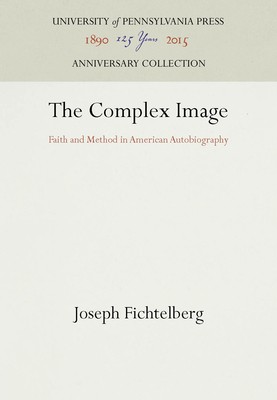
- We will send in 10–14 business days.
- Author: Joseph Fichtelberg
- Publisher: University of Pennsylvania Press Anniversary Collection
- ISBN-10: 0812281462
- ISBN-13: 9780812281460
- Format: 15.6 x 23.4 x 1.6 cm, hardcover
- Language: English
- SAVE -10% with code: EXTRA
Reviews
Description
In The Complex Image, Joseph Fichtelberg takes a twofold approach to the role of revision in significant American autobiographies. He reexamines the problem of the autobiographical subject from a poststructuralist perspective, and he places that problem in the context of American culture. As a framework for his unique study, he offers a reading of Ecce Homo that argues that Nietzsche's autobiographical I is both buried in and created by the text itself. Only by revising his text, by retelling his life to himself, can Nietzsche arrive at self-knowledge. Ultimately, Nietzsche finds himself in all literature everywhere. He becomes a universal soul.
Fichtelberg demonstrates that Nietzsche's complex ideas about where subject and language meet in a text can be used to understand the dominant millennial impulse evident in American autobiographies. Thomas Shepard cast the American portion of his autobiography as a compendium of colonial triumphs; John Woolman rearranged his Journal to make a vision of Christian unity its climax; and Walt Whitman fashioned Specimen Days to highlight his late tour of the west during which he realized an earlier poetic vision of national unity. In the nineteenth century, this easy faith in millennial union began to collapse, and Fichtelberg contends that it remained only in the autobiographies of such marginal groups as those represented by Frederick Douglass arid Gertrude Stein. He offers a close analysis of their autobiographies and, in a concluding chapter, examines the work of four recent writers: W. E. B. DuBois, Lillian Hellman, Mary McCarthy, and Maya Angelou. The Complex Image will interest scholars and students of American history and literature.EXTRA 10 % discount with code: EXTRA
The promotion ends in 19d.04:04:18
The discount code is valid when purchasing from 10 €. Discounts do not stack.
- Author: Joseph Fichtelberg
- Publisher: University of Pennsylvania Press Anniversary Collection
- ISBN-10: 0812281462
- ISBN-13: 9780812281460
- Format: 15.6 x 23.4 x 1.6 cm, hardcover
- Language: English English
In The Complex Image, Joseph Fichtelberg takes a twofold approach to the role of revision in significant American autobiographies. He reexamines the problem of the autobiographical subject from a poststructuralist perspective, and he places that problem in the context of American culture. As a framework for his unique study, he offers a reading of Ecce Homo that argues that Nietzsche's autobiographical I is both buried in and created by the text itself. Only by revising his text, by retelling his life to himself, can Nietzsche arrive at self-knowledge. Ultimately, Nietzsche finds himself in all literature everywhere. He becomes a universal soul.
Fichtelberg demonstrates that Nietzsche's complex ideas about where subject and language meet in a text can be used to understand the dominant millennial impulse evident in American autobiographies. Thomas Shepard cast the American portion of his autobiography as a compendium of colonial triumphs; John Woolman rearranged his Journal to make a vision of Christian unity its climax; and Walt Whitman fashioned Specimen Days to highlight his late tour of the west during which he realized an earlier poetic vision of national unity. In the nineteenth century, this easy faith in millennial union began to collapse, and Fichtelberg contends that it remained only in the autobiographies of such marginal groups as those represented by Frederick Douglass arid Gertrude Stein. He offers a close analysis of their autobiographies and, in a concluding chapter, examines the work of four recent writers: W. E. B. DuBois, Lillian Hellman, Mary McCarthy, and Maya Angelou. The Complex Image will interest scholars and students of American history and literature.

Reviews